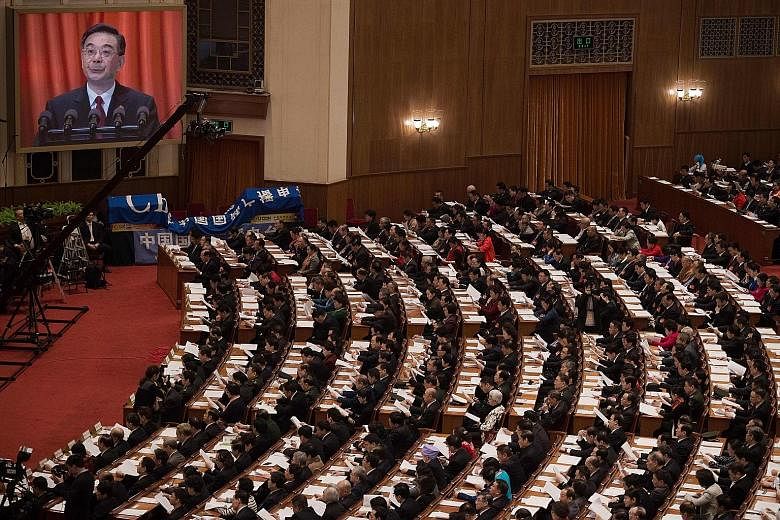China's top prosecutor has pledged that there will be no easing off in the country's anti-corruption campaign, even as the number of such cases heard by its courts last year has spiked by a third.
"We will not reduce the intensity, scale or tempo with which we strike down the tigers, swat the flies or hunt down the foxes," said Procurator-General Cao Jianming, referring to corrupt senior officials, junior officials and those who have escaped overseas, respectively.
"The zero-tolerance stance on corruption will certainly not be changed," he said yesterday, as he gave the annual report of the Supreme People's Procuratorate - which investigates and prosecutes crime - at the ongoing session of the Chinese Parliament.
At the same meeting, Chief Justice Zhou Qiang, giving the report of the Supreme People's Court, noted that 45,000 corruption cases were heard last year, involving 63,000 people - an increase of about a third over the previous year's figures.
Among the political heavyweights prosecuted for graft last year were the former vice-chairman of the powerful Central Military Commission, Guo Boxiong, and Ling Jihua, a principal political adviser of former president Hu Jintao, who is President Xi Jinping's immediate predecessor.
-
45k Number of graft cases last year. They involved 63,000 people.
-
WAR ON CORRUPTION
-
Chinese President Xi Jinping has waged a sweeping war on deep-seated corruption since assuming power, vowing to go after powerful "tigers" as well as lowly "flies". Here's a look at what the anti-graft lingo means.
TIGERS, OR LAO HU: Refers to high-ranking senior officials, such as former military leader Guo Boxiong, who was jailed for a pay-for-rank scandal.
Former domestic security chief Zhou Yongkang was another "big tiger" nabbed. He was jailed for bribery, leaking state secrets and abuse of power.
FLIES, OR CANG YING: Refers to low-ranking junior officials.
FOXES, OR HU LI: Refers to corrupt officials and business executives who have fled abroad with their assets. In November, the country's most-wanted graft suspect returned to China from the United States and turned herself in. Yang Xiuzhu, a former deputy director of Wenzhou's construction bureau in Zhejiang, surrendered to the Chinese authorities after spending 13 years in hiding overseas.
Since taking over the reins of the Communist Party in 2012, Mr Xi has waged war on deep-seated corruption, to clean up the party and maintain its grip on power.
In order to more effectively fight graft, Mr Xi has started judicial reforms that, among other things, give better protection to judges and allow them more autonomy from local politicians, as well as make it easier for people to report crime.
But the reforms are also meant to "improve the credibility of the judiciary, enhance people's sense of security and satisfaction (and) build a… just and standardised legal environment", according to Mr Xi.
Yesterday's reports showed the efforts that have been made in this direction.
These include greater ease with which people can bring cases to the courts, easier lawyer access to case information through an electronic file system and more transparency of trials through the live broadcast of public court cases.
Both Mr Zhou and Mr Cao also vowed to continue the fight against terrorism, ethnic separatist activities and religious extremism.
Prosecutors last year set up a special team to handle terror-related cases in the restive and underdeveloped western region of Xinjiang, which has a large Muslim Uighur population.
Beijing has blamed much of the violence there on Islamist militants and separatists.
Yesterday, at a Xinjiang lawmakers' meeting, the region's leaders said efforts would be made to bring about social stability, including through poverty alleviation.

